

PostCapitalism: Envisaging a Shared Future. St Paul’s Cathedral Paul Mason signing PostCapitalism Paul Mason discussing PostCapitalism, the conclusions of a shared economy not the analysis, at St Paul’s in the City of London, under the auspices of St Paul’s Institute.
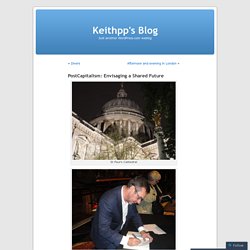
St Paul’s within the heart of the City of London. Does capitalism have a heart? A couple of years ago, Occupy were camped outside offering a different narrative. Capitalism is a complex system. Below St Paul’s, lies a Roman Temple dedicated to Diana. The Roman Temple was built by military occupiers, probably using slave labour. Capitalism is not set in stone, though the City of London would have us believe so. Capital used to finance innovation, invest in productive systems, this generated wealth, from which we all benefited.
Post-WWII we had growth through the 1950s and 1960s. We are seeing boom and bust, bubbles, but no real growth. Marxist Theory of Value, land, capital and labour, determines price. We have global monopolies, the like of which we have never seen. PostCapitalism. * Book: PostCapitalism: A Guide to Our Future.
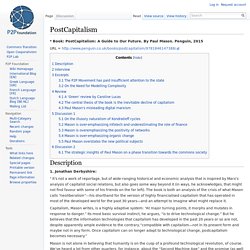
By Paul Mason. Penguin, 2015 URL = 1. Jonathan Derbyshire: " It’s not a work of reportage, but of wide-ranging historical and economic analysis that is inspired by Marx’s analysis of capitalist social relations, but also goes some way beyond it (in ways, he acknowledges, that might not find favour with some of his friends on the far left). Capitalism, Mason writes, is a highly adaptive system: “At major turning points, it morphs and mutates in response to danger.” Mason is not alone in believing that humanity is on the cusp of a profound technological revolution, of course. 2. "Over the past two centuries or so, capitalism has undergone continual change - economic cycles that lurch from boom to bust - and has always emerged transformed and strengthened. In this groundbreaking book Mason shows how, from the ashes of the recent financial crisis, we have the chance to create a more socially just and sustainable global economy. Right. Henryk Grossmann 2.0: A Critique of Paul Mason’s Book “PostCapitalism: A Guide to Our Future”
In 1857, Karl Marx (1857/1858, 161) described the emergence of “institutions […] whereby each individual can acquire information about the activity of all others” and can build “interconnections”.
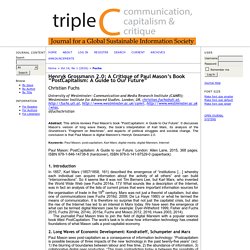
So it seems like it was not Tim Berners Lee, but Karl Marx, who invented the World Wide Web (see Fuchs 2014a, 17)! PostCapitalism: A Guide to our Future. Mason discusses the existential threat posed to capitalism by the digital revolution.
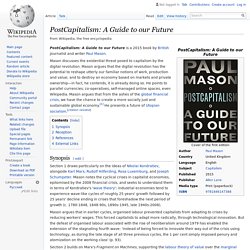
Mason argues that the digital revolution has the potential to reshape utterly our familiar notions of work, production and value; and to destroy an economy based on markets and private ownership—in fact, he contends, it is already doing so. He points to parallel currencies, co-operatives, self-managed online spaces, even Wikipedia. Henryk Grossman 2.0: A Critique of Paul Mason’s Book “PostCapitalism: A Guide to Our Future” Henryk Grossmann 2.0: A Critique of Paul Mason’s Book “PostCapitalism: A Guide to Our Future” Christian Fuchs Abstract This article reviews Paul Mason’s book “PostCapitalism: A Guide to Our Future”.
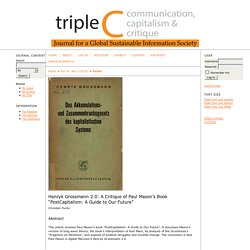
It discusses Mason’s version of long wave theory, the book’s interpretation of Karl Marx, its analysis of the Grundrisse’s “Fragment on Machines”, and aspects of political struggles and societal change. The end of capitalism has begun. The red flags and marching songs of Syriza during the Greek crisis, plus the expectation that the banks would be nationalised, revived briefly a 20th-century dream: the forced destruction of the market from above.
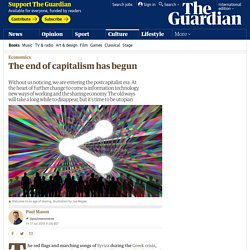
For much of the 20th century this was how the left conceived the first stage of an economy beyond capitalism. The force would be applied by the working class, either at the ballot box or on the barricades. PostCapitalism. Henryk Grossman 2.0: A Critique of Paul Mason’s Book “PostCapitalism: A Guide to Our Future” In 1857, Karl Marx (1857/1858, 161) described the emergence of “institutions […] whereby each individual can acquire information about the activity of all others” and can build “interconnections”.
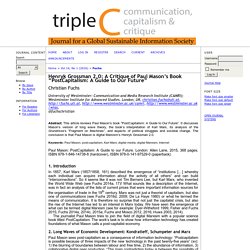
So it seems like it was not Tim Berners Lee, but Karl Marx, who invented the World Wide Web (see Fuchs 2014a, 17)! What sounds like a description of the Internet, was in fact an analysis of the lists of current prices that were important information sources for the organisation of trade in the 19th century. Marx was not just a theorist of capitalism, but also one of communications (see Fuchs 2016d, 2009; De La Haye 1980) or what he termed the means of communication. It is therefore no surprise that not just the capitalist crisis, but also the rise of the Internet has led to an interest in Marx today. The journalist Paul Mason tries to join the field of digital Marxism with a popular science book titled PostCapitalism. Who exactly is the progressive political subject for Paul Mason? References.